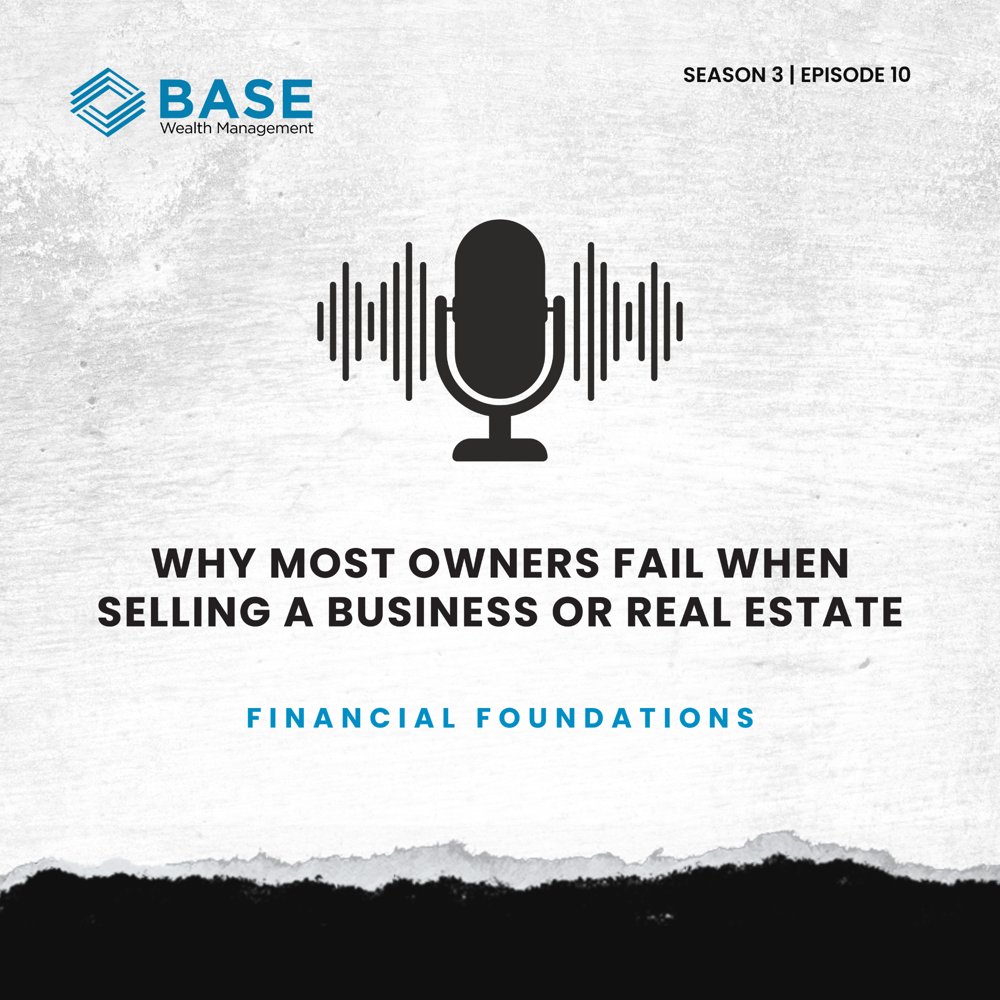
TRANSCRIPT:
So, there’s things to think about and what type of assets they have and how much they want to gift. If they gift a significant portion, they may not owe any taxes, but they may have to file a gift tax return if it’s over the $18,000 annual exclusion.
Welcome back to Financial Foundations, brought to you by Base Wealth Management, where we are the foundation to your financial plan. I’m your host, Dustin Taylor. I’m your co-host, Alex Wolfe, certified financial planner. And I’m Kyle Howell, financial advisor at Base Wealth Management.
Today we’re going to discuss some crucial aspects of financial planning, especially when it comes to the financial well-being of your family across generations. Okay, let’s dive right in.
Alex, the primary goal of financial planning is to ensure that their money or people’s money can last for their entire lives. Practically speaking, what does that mean?
Yeah, so what that means is that you’ve saved up, relatively speaking, for many years, your whole life, and maybe you’ve set some goals and you need income to live off of to supplement your retirement for many, many years until you or your spouse pass away. Yeah, so to add on to what Alex was saying is once that goal is achieved, you know, many people want to take care of their kids, want to take care of their grandkids, maybe pass on assets, whether that be during their lifetime or, you know, after they pass. So that sounds like a comprehensive approach.
I’ve seen a question come in asking that if someone was about to pass, so probably within the last year of their life, and they want to start giving some of their money away to their kids and grandkids to enjoy it, is that something that they should do or should they wait until after they pass?
There’s definitely some strategies there to think about. One, if they’re nearing the end of their life, there may be reasons to wait to give some of that money to their children or grandchildren, but there are things that they can give now while alive that won’t have a big impact on either of their tax situation. Yeah, and Alex and I were talking about a specific client this morning that had some very large gains in her account, and, you know, she’s not necessarily on her deathbed by any means, but is close to the end of her life, and it didn’t make sense for her to start transferring certain stocks from her portfolio to her kids and grandkids because of those gains being transferred to the kids. So, you know, when she does pass away at some point in the future, the kids will inherit those specific stocks at a step up in cost basis, therefore negating any of the tax ramifications of her giving those stocks while she was still alive.
So let’s start from the beginning. What would be the first step?
The first step would be to, you know, assess their financial situation and what do they have to gift. Is it property? Is it assets in a taxable account like Kyle was talking about where there could be some highly appreciated assets that would make sense to gift after death and get the step up? Or is there money in an IRA where these individuals have to take like a required distribution and they can just satisfy that and give money to the children or grandchildren or even a charity if that’s something that they’re inclined to do. So there’s things to think about and what type of assets they have and how much they want to gift. If they gift a significant portion, they may not owe any taxes, but they may have to file a gift tax return if it’s over the $18,000 annual exclusion. So they should first determine what the goal is of the gifting and then how much they can gift. Right. So Kyle, once the goal is established, what’s the next step? So the next step would be, again, kind of determining, you know, do they want to gift during their lifetime or wait to leave a legacy behind when they’re gone? That would be where I would want to start the planning process and how are we going to gift these assets?
So why is it important to decide when to gift? What sort of implications are there?
I guess that depends on what type of account, assuming we’re talking about assets in IRAs and trust type accounts, where are those assets located? What type of tax ramifications are we going to have on a trust account versus an IRA? So what sort of tax implications would there be? So as I mentioned before, you can gift up to $18,000 per year to anyone. If you go over that, then you have to file a gift tax return, even if no gift tax is owed. And you have a lifetime exclusion amount, which is set to be cut in half here shortly if the tax cuts and job acts is not extended or that a state tax exemption is not put back in place. But that’s only for like the ultra wealthy where that’s coming into place. Most people don’t necessarily have $13 million to gift or $26 million combined if you’re a couple. However, there’s things, as we mentioned, about the step up in cost basis for certain types of assets that make more sense to gift after death versus dream their lifetime. So you can definitely start gifting while alive and see your children or grandchildren enjoy that money or use it on a vacation or it depends on your health and if you’re able to go with them or whatever you want to do as far as your goal of gifting it. You can also start super funding college, you know, where you can put five years worth of contributions into like a 529 account if you have enough cash to, you know, super contribute to those types of accounts. If you’re wanting to set your children or grandchildren up with education, those are some things that you can also look to do. And add to the limits, you know, Alex mentioned $18,000 per year and that’s per person. So if you’re a married couple, it’s $36,000 and say you have two kids, it’s $18,000 to your son and $18,000 to your daughter. And if your kids are married, then it’s potentially $36,000 per child and their spouse. So there’s quite a bit of money that can be gifted away while you’re still alive. Without any tax implications.
So is there a benefit to investing the money before gifting it?
Not necessarily, but you can. If you’re looking to gift like individual stocks, like I know some grandparents have gifted their grandkids like Disney stock shares or something that maybe there’s a mutual connection. Maybe it was their old company stock shares or something like that. In which again, you might want to be mindful of the cost basis if you’re gifting stock from like a brokerage or taxable account. But again, if you’re taking it out of an IRA, you can either be cash or it can be stock and have really no discernible difference in the tax implications to either of the parties. So no, I don’t think it really necessarily makes a difference. However, it might be a good educational time where the grandparent or parent can talk to their, whoever they’re gifting it to about investing and having like a conversation about why it’s important to save and invest in quality companies or something like that.
Kyle, what about the right time horizon for investing at their age?
Let’s think about as you’re getting older and let’s say you’re in your late eighties or early nineties and you should probably be pretty conservative with your investments. But you’ve come to a point, you’ve realized that I’m not going to outlive my money. I’m going to have plenty of money left over when I’m gone. So maybe now I can take on more risk to leave more behind to my kids. For instance, I have a specific client in mind that is in her mid nineties and she’s in an all stock portfolio and she’s got years and years and years of capital gains on these stocks and we don’t want to sell them because we’re going to leave those specific stocks to her four kids. So that time horizon is changing just based on a situation. That makes sense. So going back to the situation that I brought up at the beginning and kind of to summarize what you should do.
If you had parents who are at the last stage of their life and they want to gift money to their kids or their grandkids, what should they do? What would be your recommendation?
In this situation, I highly encourage them to think about the assets that they have and what they want to start gifting. From a tax standpoint and also how they want the money to be used. And then also make sure their beneficiary designations are all proper, the accounts are titled correctly. So that way at the end of their life when the family is mourning and memorializing them that they’re in a good place and don’t have to worry about estate headaches. And also continue to gift up to the annual exclusion if they can do so. As Alex and Kyle have said, planning for the future involves setting your goals, considering tax implications, and make strategic decisions on when and how to gift. If you’d like more information about various topics, you can visit our website at basewealthmanagement.com.
Subscribe to this podcast, subscribe to our YouTube channel. You can also submit your questions like our listener today. You can send those in to us at question at basewealthmanagement.com. I’m your host, Dustin Taylor. I’m your co-host, Alex Wolfe. And Kyle Howell, financial advisor. And happy listening.









